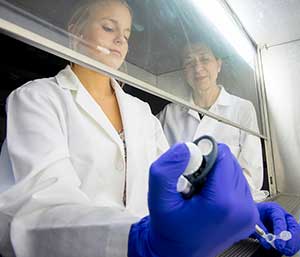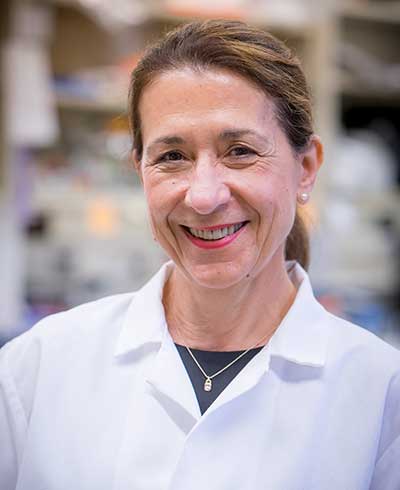The interests and expertise of the Andrisani laboratory are on molecular mechanisms of transcriptional regulation, epigenetics, and signal transduction involved in cell growth control, cellular differentiation and cancer pathogenesis.
We have been studying cellular pathways activated by Hepatitis B virus (HBV) infection involved both in virus biosynthesis and disease pathogenesis. Our goal is to identify essential mechanisms that can be targeted to suppress HBV infection and the resulting HBV-mediated liver cancer. One such mechanism identified by our studies is activation of the cellular S/T kinase Polo-like-kinase 1 (Plk1) by the virus-encoded oncogenic HBx protein. We have shown that Plk1 activation exerts a crucial role both in HBx-mediated oncogenic transformation, and serves as a positive effector in HBV replication. Our ongoing studies with the team of Prof. Fabien Zoulim M.D.,Ph.D., INSERM, France, support that Plk1 can be explored as a novel antiviral target for suppression of HBV infection.
In addition, we have shown that Plk1 activation by HBx downregulates the activity of two chromatin modifying complexes, the Polycomb repressive complex2 (PRC2) and the LSD1/CoREST/HDAC1. The consequence of this epigenetic deregulation is re-expression of a hepatic cancer stem cell (hCSC)-like group of genes. In collaboration with the team of Professor Philippe Merle, M.D., Ph.D., INSERM, France, we have shown that expression of this gene signature in clinical samples is associated with poor patient prognosis. Thus, our studies have provided the first direct evidence that chronic HBV infection epigenetically reprograms normal hepatocytes.

Our current studies have identified yet another essential piece of this epigenetic puzzle, the RNA helicase DDX5, involved both in HBV replication and HBV-associated liver cancer. We are investigating the role and mechanism of the interaction between PRC2 and DDX5, from the point of view of the function/stability of the PRC2 complex. In continued collaboration with the teams of Prof. Merle and Prof. Zoulim, we will analyze the clinical relevance of our observations, in terms of HBV biosynthesis and HCC pathogenesis. Thus, our studies will reveal novel insights of HBV-mediated liver cancer, viral infection and regulation of DDX5 activity and function . Importantly, these studies are necessary first steps to elucidate novel targets for therapeutic intervention targeting essential steps of HBV infection and HBV-associated liver cancer.

Professor of Basic Medical Sciences
Purdue University College of Veterinary Medicine
625 Harrison Street
West Lafayette, IN 47907
Phone: 765-494-8131
Fax: 765-494-0781
Email: andrisao@purdue.edu
For a complete listing of Dr. Andrisani's publications, please visit the National Center for Biotechnology Information.
Generously provided by the National Institute of Health (NIH).